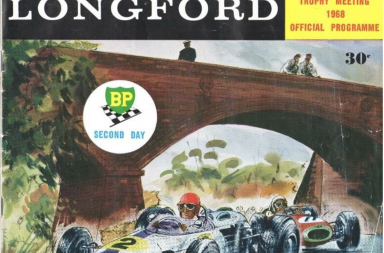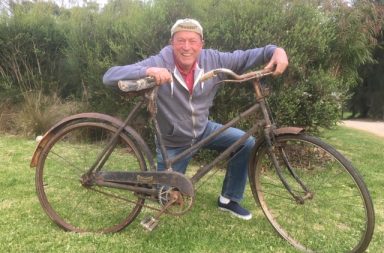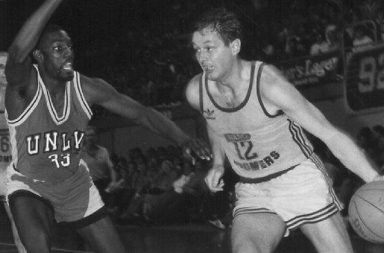By NEIL KEARNEY, August 2017
It takes a village to raise a child is a proverb that originated many moons ago.
In this digital age, when most of the world’s population is hooked onto a global superhighway, the influences on our children are beyond anyone’s control. Which makes it more important than ever that young people are encouraged to connect with their local community and develop good people skills. My formative years were in a simpler time – Longford, Tasmania, in the 1960s was a community in which everyone said “g’day” with a smile and everyone had a place. Elders yarned and joked with the kids and they set us right when we were out of line. I was an early morning paperboy for the town’s newsagents Terry and Betty Ling, which meant carrying a bag of rolled-up newspapers on my pushbike and tossing each one in the general direction of the occupant’s front door. One morning a paper landed on the roof of a cottage in Mason Street. Instead of waking the residents to borrow their ladder, I clambered up a lattice to try to climb onto the roof, only to crash-land into a stinking compost heap. The startled owners came out in their pyjamas to find their paperboy marinated in a pungent pile of chook manure and food scraps. Instead of haranguing me, they cleaned me up the best they could and gave me a leg up onto my bike. The couple ribbed me for years about that escapade. Laughter is the best medicine; it’s also the glue that sticks a community together. Little jokes between people are connections that last a lifetime. Country places are renowned for their dry-witted characters and for nicknames handed down over generations. Locals have got accustomed to each other’s quirks; they know whether a person is noisy or quiet, punctual or dilatory, generous or mean-spirited, cautious or carefree, sociable or reclusive, teetotaller or tosspot. Familiarity fortifies friendships. Sometimes neighbours know a little too much, and things get gossipy. But usually the togetherness outweighs any negatives. On Longford’s front street in the ‘60s you saw some funny sights – like the irrepressible Dick Fulton driving his manual station wagon, despite having lost his left arm. Somehow, his right wing reached across to grab the gearstick on the steering column, at the same time as his left foot worked the clutch and right foot was planted on the accelerator. Locals knew to give Dick plenty of room. Walking along Marlborough Street, Longford, across from the fire station, you could stop for a chat with the wonderful ‘Mrs Swint’. She was so friendly and witty; you always came away from a yarn with her feeling invigorated. In the ‘60s, James’ Service Store was an institution, as colourful as a circus; it even had a huge canvas mural for IXL jam that dominated the big top. Gordon was the ringmaster, while Joan called the shots and Gary was the loveable clown. You’d look up to see Alfie or Keith performing a trapeze act on the ladder, swinging across the top shelves to clutch cans and packets. Ah, the halcyon times when Longford’s heart would beat loud with four grocery stores that actually served you – there was James’, Reinmuths (later Crowdens and then Rattrays), Roy Preece’s Corner Store and Browns the Big Store. Across Marlborough Street from James’ was McCullaghs’ Butchery, where wife ‘Celi’ maintained order and conducted business while husband Mick chopped meat and played the larrikin, a role he was born for. Mick often told the story against himself about the occasion when a woman came into the butchery asking for a medium sized chicken. It was late on a Friday and Mick had only one small chook left. He started to wrap it, but the lady stopped him, saying it was a bit undersized for her needs. Without blinking, Mick cunningly picked up the chook and told the lady he would go out the back to fetch her a slightly bigger chook. He returned seconds later with the only chook he had and started wrapping it again. Unfortunately for Mick, the lady studied the ‘second’ chook more closely and decided it too wasn’t big enough. She proposed a resolution to their problem, telling Mick that she wanted to buy both the chickens he had shown her! Whenever Mick told that story, and he shared it hundreds of times, he roared with laughter. Mick (“m-a-a-a-t-e”) was one of a kind.
‘Rocky’ Walker did the rounds of the town in his old ute, collecting people’s food scraps to feed his pigs. Rocky lived in a weather-beaten cottage along Tannery Straight. On weekends it morphed into becoming Rocky’s Tavern, a watering hole where Rocky and his cobbers fortified their friendships. Rocky was a ‘hard case’, but he had a soft centre. On one occasion he required medical attention to his waterworks and needed to phone the town’s surgery to make an appointment with a doctor. But he was hesitant about making the call because the inquisitive receptionist had a habit of enquiring about the nature of the patient’s problem. A friend advised him that – when the receptionist asked what was wrong – he should say he had an issue with his ear. When Rocky eventually summoned the nerve to make the call, and was asked to specify his problem, he stammered “My-my-er-ear!” The receptionist followed up: “And what shall I say is wrong with your ear, Mr Walker?” A flustered Rocky coughed and spluttered and eventually replied: “I can’t p-p-p-piss out of it!” Rocky was part of the rich tapestry of good-hearted knockabouts that made life humorous, eventful and unique. Their colourful lives and the tales that were told about them may explain why our small Tasmanian town in the 1960s was a seedbed for some latter day storytellers. Often we read and hear about the disadvantages facing children growing up in the country. It’s natural that many young people will leave the nest to pursue their careers in the cities or go to live on the mainland or overseas. Every chick is born to fly. Cut off their wings and they’ll never fulfil their potential. The children who leave the nest may build lives in faraway places, but the attitudes they formed in their childhood years will always be part of their identity. They will forever belong to the village that raised them. I’d argue that growing up in the country has some advantages over a city upbringing – life in a village is more connected and personalised, which means kids build real confidence in a place where most people still greet each other with a hearty g’day. In the bush you are someone. In the big smoke you can get lost in the crowd. One point is for sure: the old-timers in the country know how to use laughter to oil the wheels of their community. A story handed down from the 1950s was of a time when some Longford adults were concerned that teenagers were using the shrubbery at the Mill Dam to engage in amorous activities at night. The concerned citizens demanded that the local police constable stake out the Mill Dam and put an end to these shenanigans. Several cold nights passed and the constable’s vigils had proven fruitless. Finally, one night he caught wind of anxious voices coming from beyond the gorse bushes near the river’s edge. He heard a female whisper breathlessly: “Can I kiss it on the head before you put it in?” Immediately, the constable sprung from behind the bushes and shone his torch into the faces of the culprits, only to find that they were two old ladies intending to drown unwanted kittens. No amorous teenagers were grounded, but at least the long arm of the law saved the kittens.



